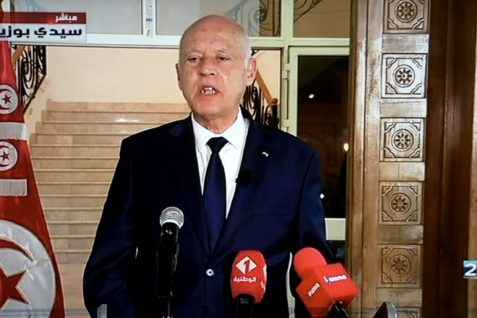The campaign for the referendum on Tunisia’s new constitution started on Sunday, though Tunisians are divided about the content of a controversial draft released last week.
The referendum is scheduled for July 25, exactly a year after Tunisian President Kais Saied suspended parliament and seized power.
He said the move was necessary to “save the country” from political and economic crisis, though this prompted strong criticism from the opposition, which accuses him of a slide toward totalitarianism.
The new draft would bestow broad powers on the president and curtail the authority of the prime minister and parliament.
Several organizations, including the powerful UGTT central trade union, have deplored the absence of a public dialogue in preparing the new constitution that they have dubbed “the Constitution of Kais Saied.”
In the street, some felt the new constitution wasn’t written for the country’s sake, but rather for the president’s.
“I will not participate in the referendum, simply because it does not represent me. It is the constitution of one individual, of Kaies Said,” said Mohsen Saad, a teacher.
The draft text, published late Thursday, would give the president greater executive power than the prime minister and establish a bicameral parliamentary system for the first time.
That would be a shift from the current constitution, which was seen as groundbreaking when it was passed in 2014 after consultations with multiple groups.
The 2014 constitution sought to limit presidential powers after the Arab Spring protests put an end to 23 years of unchallenged reign by former President Zine El Abidine Ben Ali.
He was overthrown in 2011 by a popular revolt that triggered a similar movement in several countries of the region against autocratic leaders.
The new charter would give the president the right to appoint the prime minister and the ministers, and to fire them. It restricts presidents to two five-year terms.
The new draft constitution removes a reference to Islam in Article 1 of the old charter, which read that “Tunisia is a free, independent and sovereign state, Islam is its religion.”
The preamble to the new version says Tunisia is an integral part of the Islamic community and that the state ensures the protection of religious rights — as long as they do not undermine public security.
Saied and some others blamed Islamist party Ennahdha in part for Tunisia’s political crisis last year. Ennahdha, which dominated parliament before it was suspended, is among Saied’s fiercest critics.
“I support this constitution or the coup as they (opponents) call it,” said 45-year-old Tunis resident Abdelawi, whose last name wasn’t given.
“We are with him in his victory over the Islamists and the new assembly.”
If adopted in the July 25 referendum, the new constitution would enter into force as soon as the results of the vote are announced.




















